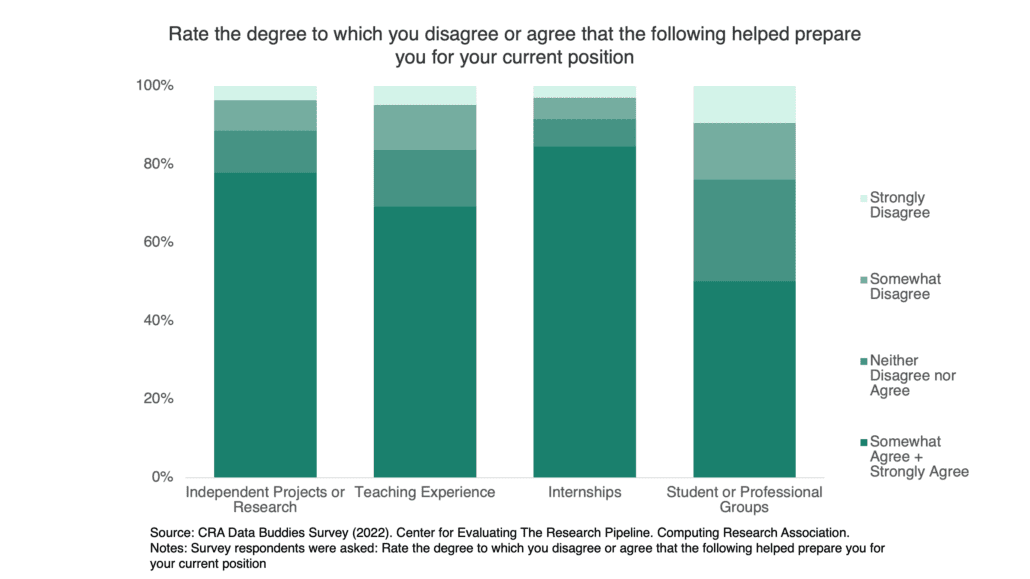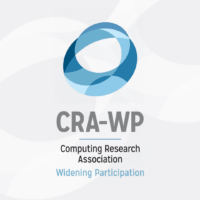Infographic: Internships and Independent Research Projects Are Top Two Activities That Prepare Students for Their Early Career After College
By Rainey Jernigan, Research Associate, CERP

During the 2022 fall semester, recent graduates (within five years of graduation) who majored in computer science (CS), information technology (IT), and computer/software engineering (CSE) and currently employed were asked about the extent to which various professional activities they may have engaged in during their college career prepared them for their current position. This graphic specifically explores a survey question that asks about students’ experiences outside of an REU. The positive impact of formal REUs have been studied and communicated (e.g., One Year Later, CERP Data Still Indicate REU Participation Relates to Graduate School Enrollment; Quality Research Experiences Anchor the Future of CISE Undergraduate Education). Based on these results activities outside of formal REUs are also impactful in students’ careers.
Among the respondents who are currently working, the survey asked what activities have helped them prepare for their current position (measured using a Likert scale of strongly disagree to strongly agree). The following are the top reported activities that helped respondents prepare for their current role:
- Internships- 85% of respondents agreed
- Independent Research Projects- 78% agreed
- Teaching Experiences- 69% agreed
- Student/Professional Groups- 50% agreed
Internships, independent research projects, teaching experiences, and participation in student/professional groups positively impacted the perception of success in their current jobs. On the other hand, when current undergraduate students were asked the question: “Up to this point in your undergraduate program, which of the following experiences were you involved in that were NOT part of a formal REU?”, only 55% of the respondents who are current students had participated in activities such as Independent research projects, Course-based research projects, Internships or co-ops, Research Assistant, Teaching Assistant, Entrepreneurial or consulting projects, K-12 outreach, Computing-related student groups.
These findings are important, because computer science activities can positively shape the student experience by expanding their research interests, preparing them for the future (whether that be in graduate school or in the workforce), and broadening their perspectives. Promoting activities such as internships, independent research, teaching, and participation in student/professional groups will allow students to gain important skills for their future roles.
Notes:
The survey data analyzed for this infographic were collected by Center for Evaluating the Research Pipeline via The Data Buddies Project. The sample includes 7,949 respondents for the question: “Up to this point in your undergraduate program, which of the following experiences were you involved in that were NOT part of a formal REU?”; and 650 respondents for the question: Rate the degree to which you disagree or agree that the following helped prepare you for your current position. Activities available to choose from: Independent research projects, Course-based research projects, Internships or co-ops, Research Assistant, Teaching Assistant, Entrepreneurial or consulting projects, K-12 outreach, Computing-related student groups, None of the above
Level of agreement is measured using a Likert scale (1) Strongly Disagree – (5) Strongly Agree. In the analysis a rating of (4) Somewhat Agree or (5) Strongly Agree were considered as “agreement” and reported as a single category.
This analysis is brought to you by the CRA’s Center for Evaluating the Research Pipeline (CERP). CERP provides social science research and comparative evaluation for the computing community. Subscribe to the CERP newsletter here. Volunteer for Data Buddies by signing up here.
The Data Buddies Project is currently supported through National Science Foundation (NSF) awards CNS-1840724, CNS-2036717, DUE-1821136, sub-awards and contracts, and direct CRA contributions. Previous NSF awards that supported DBS include CNS-1246649 and DUE-1431112. Any opinions, findings, and conclusions or recommendations expressed in this material are those of the author(s) and do not necessarily reflect the views of the National Science Foundation.









